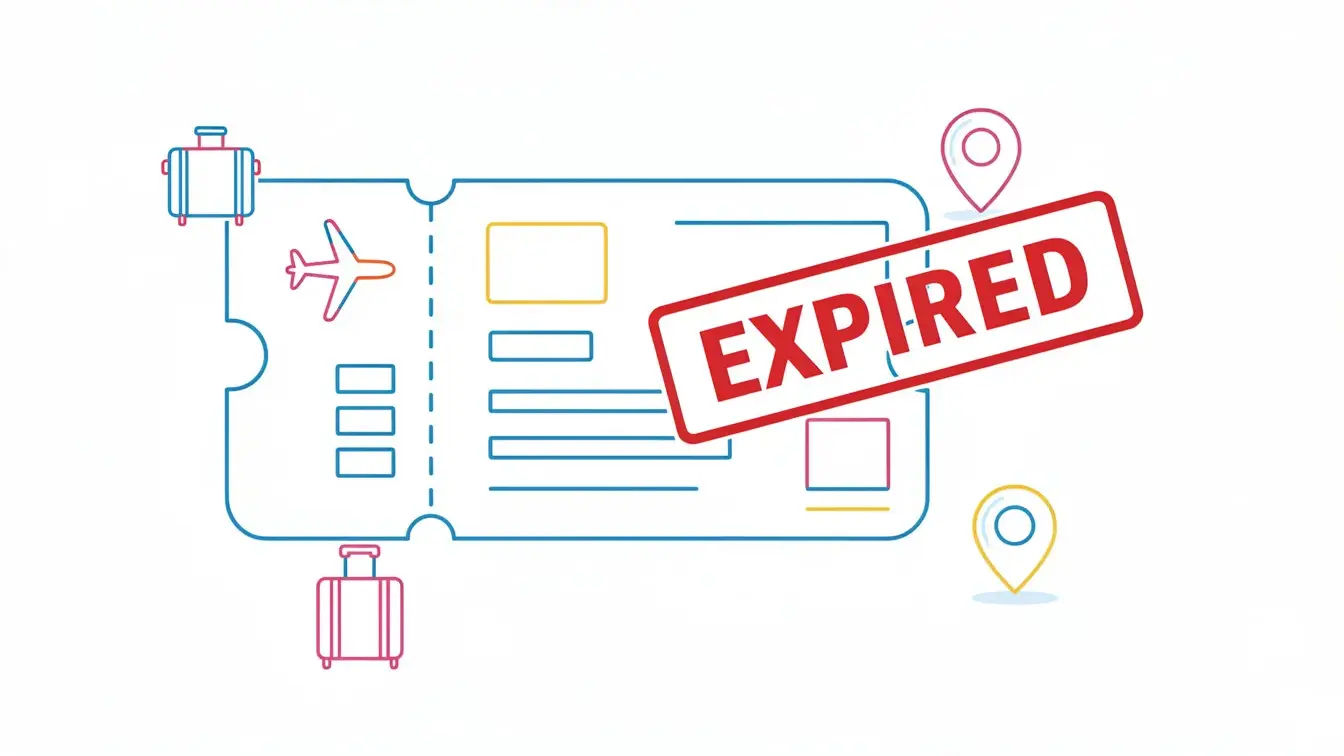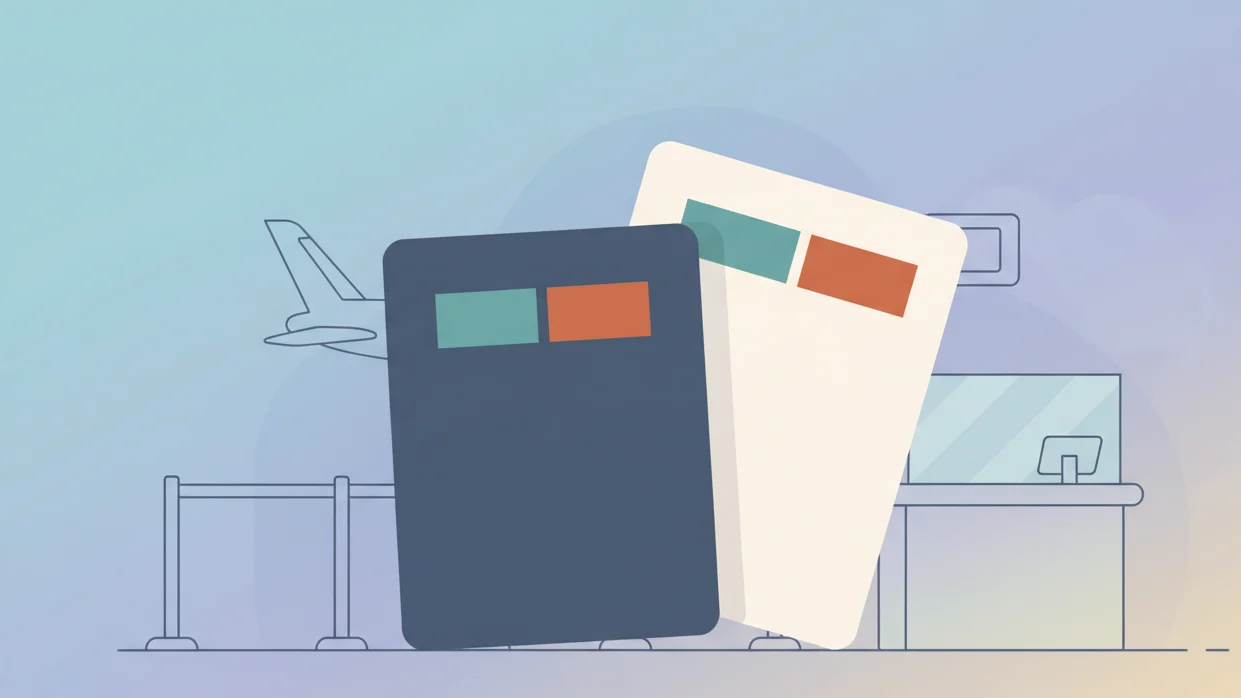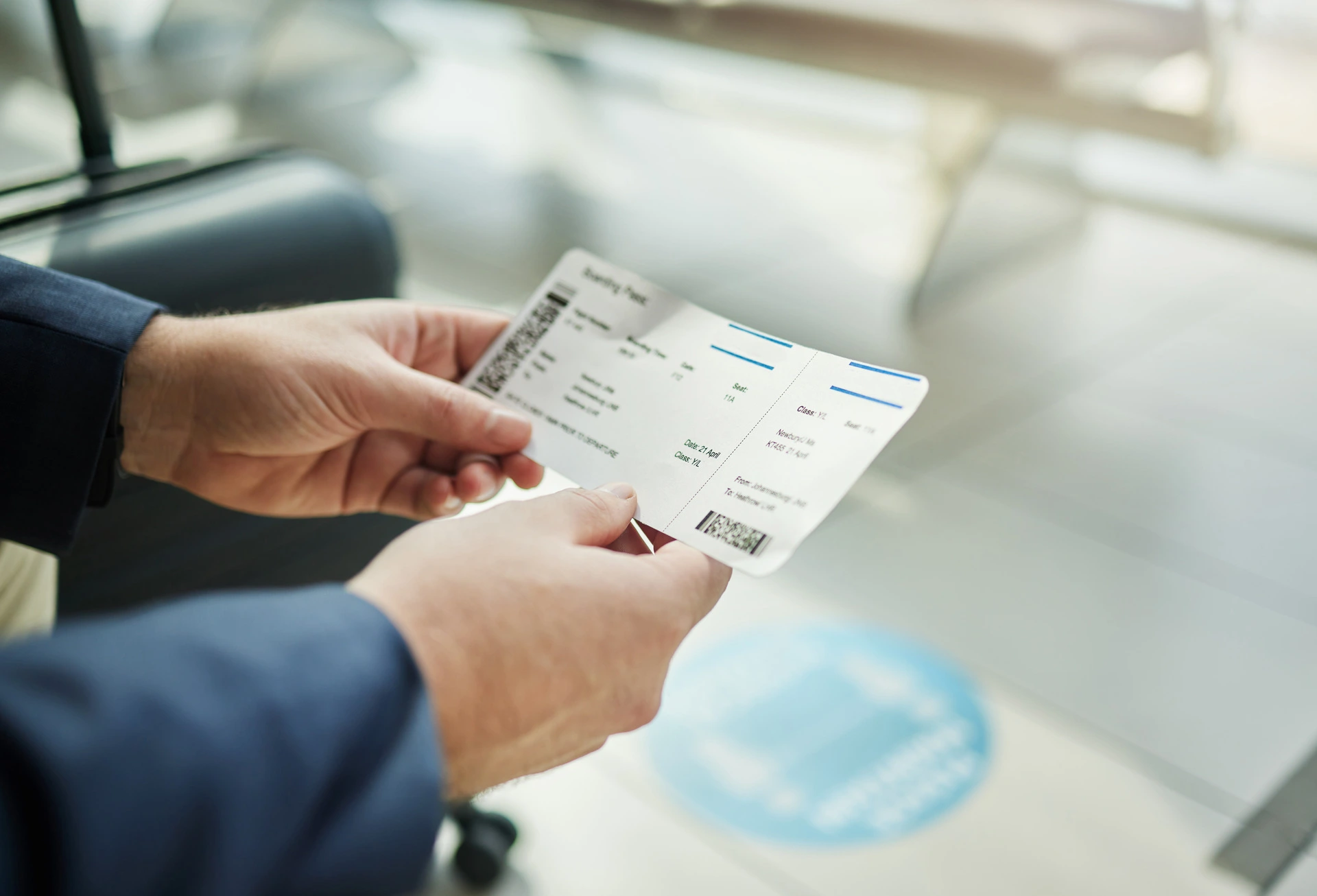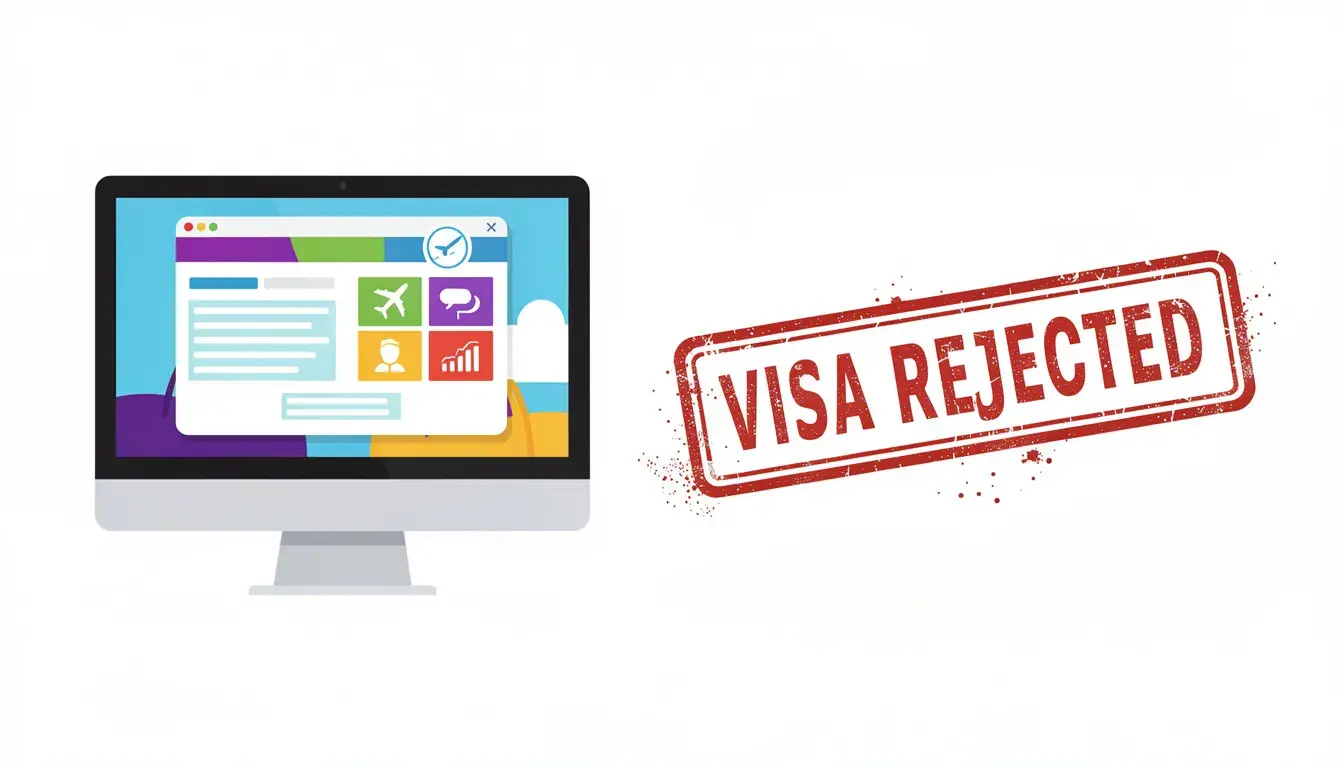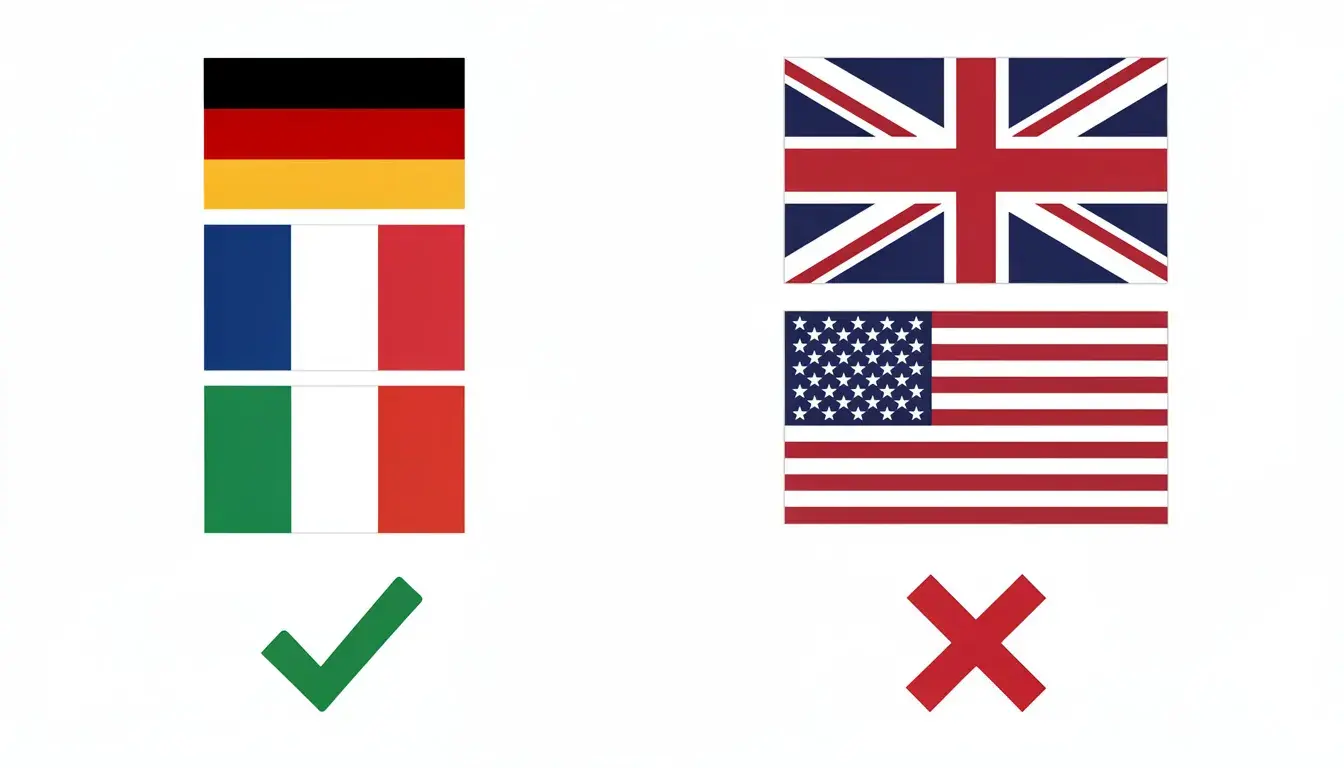Do You Need Onward Ticket For Maldives Visa?
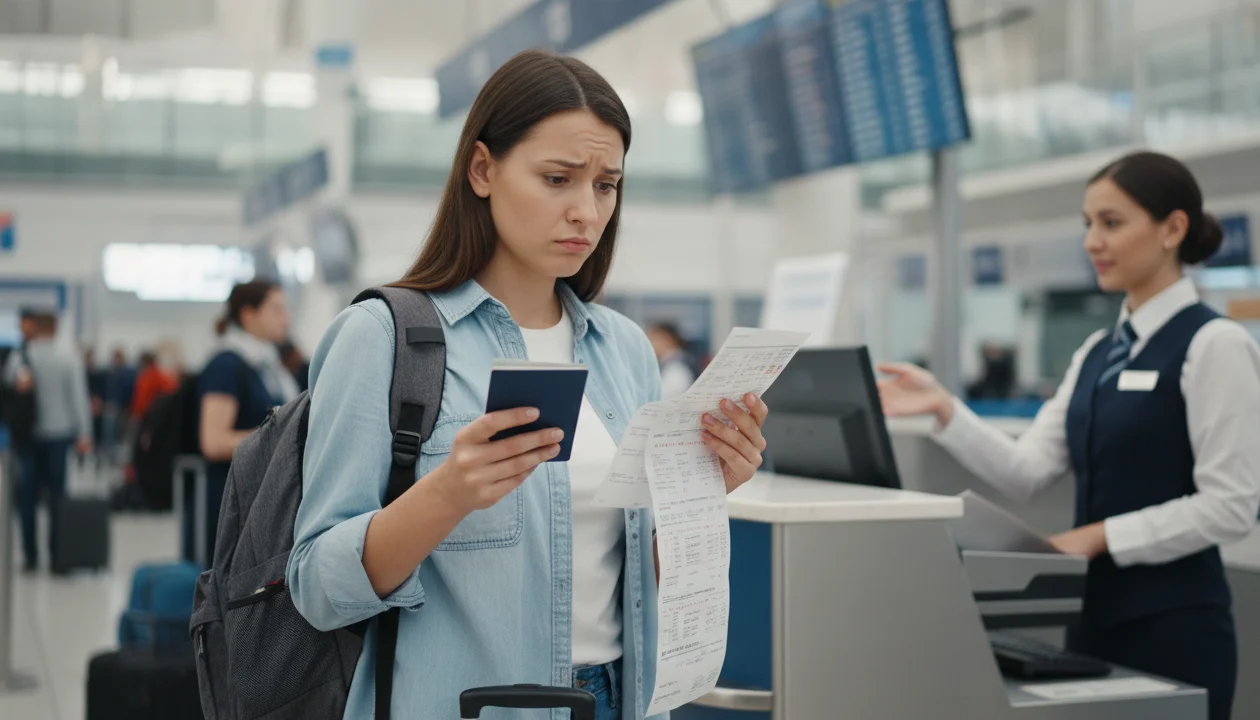
Maldives Visa From India: Do You Actually Need an Onward Ticket?
You have your Maldives photos saved, outfits sorted, hotel booked, flights checked, and then someone suddenly asks, “Do you have a return ticket?” That one question can decide whether you board your flight from India or spend the day at the airline counter arguing about rules no one explained clearly. For many Indian travelers dreaming of pristine beaches and overwater bungalows, understanding the role of a dummy ticket as proof of onward travel is crucial to avoid last-minute hassles.
The Maldives is visa on arrival for Indian passport holders, but that does not mean “no questions asked.” Airlines, immigration officers, and online forums all seem to say slightly different things about onward tickets. In this guide, we will cut through that noise so you know exactly when an onward or return ticket is expected, who gets checked more often, and how you can protect your trip without burning money on unnecessary bookings. If you are unsure which return date to choose, check our FAQ for quick tips on flexible options. For more insights, explore our blogs on visa travel hacks, or learn about our service at About Us. If you are unsure which return date to choose, book a dummy ticket now and finalise real flights later.
onward ticket for Maldives visa is one of the most useful documents travelers prepare when organizing international trips. While most countries do not ask you to buy a fully paid ticket upfront, they do expect a verifiable proof of travel intent that clearly shows your entry and exit plan. This helps demonstrate that you will follow your schedule and return on time.
Using a professionally issued and verifiable onward ticket for Maldives visa is the safest and most convenient way to satisfy this requirement without financial risk, especially for visa applications and immigration preparations.
Last updated: November 2025 — verified against the latest traveler documentation practices and global consular guidelines.
Table of Contents
Do You Really Need A Return Ticket For Maldives From India?
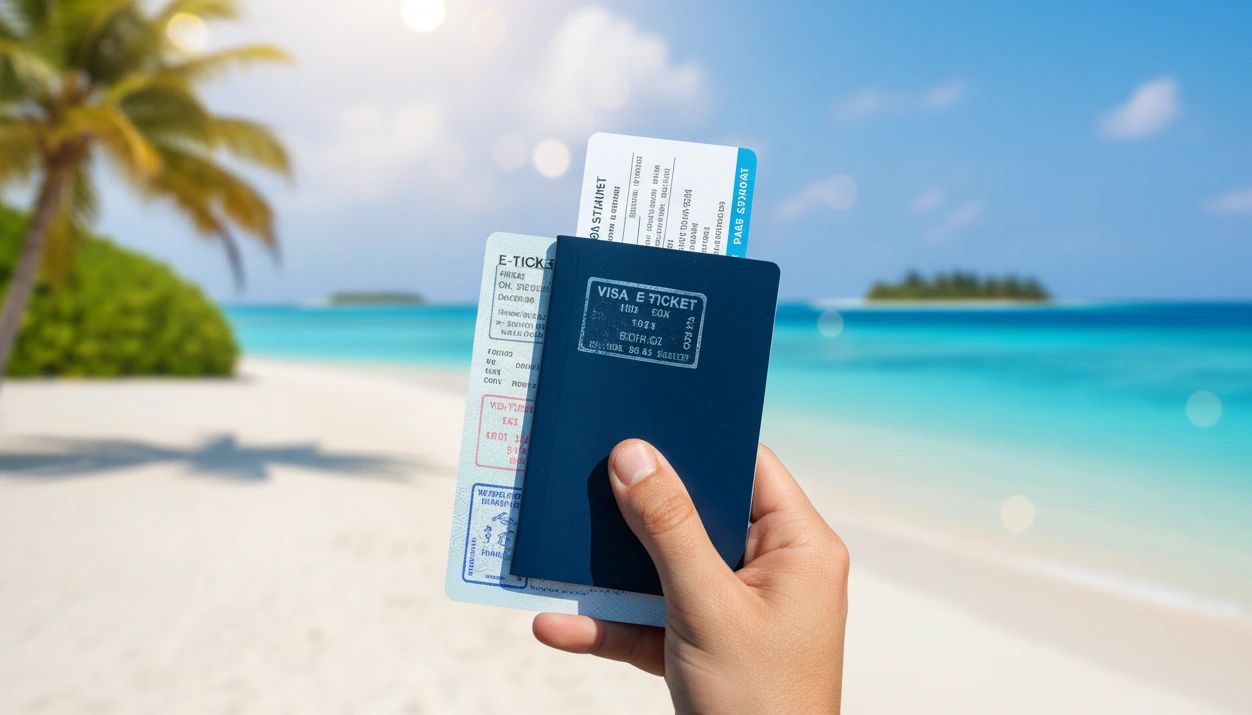
Before you start imagining turquoise water and long afternoons by the lagoon, you need to figure out one practical detail that can make or break your trip. Will the Maldives immigration and your airline actually expect you to show a return or onward ticket when you arrive from India?
Let’s clear up the confusion by separating the official rules from what really happens at airports. Give airlines exactly what they want to see with a legit, instantly delivered dummy ticket booking.
What The Maldives Says About Return And Onward Travel
The Maldives is famously easy for tourists, but the country still follows a set of basic entry conditions for everyone, including Indian nationals. Officials expect you to arrive with a clear plan, not just a passport and hope.
The published entry guidelines mention a few essentials:
- A passport with sufficient validity
- A complete travel itinerary that includes a confirmed return or onward journey
- A prepaid hotel or guesthouse booking
- Enough funds to support your stay
- A submitted Traveller Declaration via the IMUGA portal before arrival
None of this is unusual. Almost every visa-on-arrival destination asks for similar documents. The key point is the line about a travel itinerary with an exit plan. That is their way of saying they want to see a confirmed return flight or another ticket showing you are leaving the Maldives within your permitted stay.
So yes, officially, a return or onward ticket is part of the entry requirements. Even though the visa is issued on arrival, the expectation is that you come prepared. To learn more about global onward travel standards, check the International Air Transport Association (IATA) guidelines.
What These Rules Mean If You Hold An Indian Passport
Indian travellers usually hear that the Maldives is “visa-free for 30 days” or that Indians get an easy visa on arrival. Both statements are true. You do not apply in advance. You fly in, clear immigration, and your passport gets stamped. This makes the process feel breezy compared to many other destinations.
But here is the detail many travellers miss. The 30-day visa on arrival is not unconditional. Immigration officers grant it when they see that you meet the standard tourist entry requirements. That includes your accommodation booking, funds, and a visible plan to exit the country.
This means the friendly arrival policy does not automatically exempt you from showing onward travel. Indian tourists with typical resort bookings and a simple round trip rarely face questions. But if your profile is less conventional, the rules are applied more actively.
For example:
- Indians arriving on one-way tickets
- Travellers planning long, flexible stays
- Visitors with limited funds or vague itineraries
- People who cannot explain where they are staying after the first night
In these situations, the immigration officer may ask for proof of departure. If you cannot show it, they can shorten your stay period or even decline entry.
So while the Maldives feels like one of the easiest destinations for Indian travellers, it is still smart to carry the documents they expect just in case your profile triggers a closer look. Expanding on this, many travelers from Delhi or Mumbai report smooth entries when prepared, but those flying from smaller airports like Kochi sometimes face stricter airline checks due to varying enforcement.
What Really Happens At Immigration In Malé
Now let’s talk about real life. Do officers at Malé actually check everyone’s return ticket? Not necessarily.
If you are a typical Indian tourist heading to a resort for a five- or seven-day stay, the process is usually smooth. Officers tend to scan your IMUGA QR, confirm your hotel, glance at your passport, and wave you through. They don’t always ask for your flight out of the Maldives because your overall profile already makes sense. You look like a standard holidaymaker with fixed plans.
But immigration officers are trained to look for gaps. They ask for onward travel only when they feel something is missing or unclear. Situations that trigger questions include:
- A stay close to the full 30-day limit without enough funds
- A one-way ticket from India with no onward booking
- Only one night of accommodation booked
- Unclear answers about your travel plans
- Travel patterns that suggest frequent long stays abroad
In cases like these, the officer may ask to see your exit flight before stamping your passport.
It’s important to understand that this is not random. The Maldives is strict about preventing illegal work and overstays, so they check travellers whose plans seem uncertain. For Indian tourists with normal holiday itineraries, the process remains quick and uncomplicated. For those entering with more flexibility, the onward ticket rule becomes much more real.
The safest approach is simple. Even though many travellers never get asked, you should be ready to show a confirmed exit plan within your allowed stay. It keeps the conversation short, smooth, and stress-free, which is exactly how you want your Maldives trip to start. Recent traveler forums highlight that post-2024 updates to IMUGA have made digital verification faster, but physical proof like a dummy ticket still reassures officers during peak seasons.
Who Actually Gets Questioned About Onward Tickets At Maldives?

Not every Indian traveller is treated the same at check-in or at Malé immigration. Some people are waved through with a smile. Others are asked detailed questions about their exit plans, funds, and itinerary.
If you know which profiles attract more attention, you can decide how much proof you really need to carry and where you can stay flexible. Planning an open-ended route after the Maldives? Book a dummy ticket that matches your exit story perfectly.
Resort Crowd From India: Low Risk, Still Checked Sometimes
If you are flying from India on a simple round trip and heading straight to a resort or well-known hotel, you are in the lowest risk group.
Your profile usually looks like this:
- Return ticket within 5 to 8 days
- All nights booked at a resort or one or two properties
- Clear honeymoon or family holiday vibe
For travellers like this, immigration in Malé often takes just a couple of minutes. Officers see your IMUGA QR, your hotel booking, and a short stay. In many cases, they do not even ask to see your return ticket because they can already guess you have one.
Where can issues still appear?
- Your return is very close to the 30-day limit.
- You have booked only the first two nights and have no plan for the rest.
- Your hotel booking looks suspicious or cannot be matched in the system.
In these cases, the officer may ask extra questions. If you are travelling in peak season with high fares, airlines in India may also be strict at check-in, even if Malé immigration would not have bothered you later. So a visible return booking is still your safest bet. For honeymooners, pairing this with romantic itinerary details often seals the deal effortlessly.
DIY Island Hoppers: Friendly, But Need A Story
More and more Indians skip all-inclusive resorts and choose local guesthouses on islands like Maafushi, Thoddoo, or Ukulhas. The prices are better. The experience feels more authentic. The trade-off is that your plans often look less “packaged” on paper.
A typical DIY island hopper might:
- Stay 10 to 20 days
- Split the trip across 2 to 4 islands
- Book some nights in advance and leave the rest open
For officers and airline staff, this is still a normal tourist profile, but it requires a bit more explanation. If you only have the first two nights booked and you tell the officer you are “figuring things out on the way,” they may dig a little deeper.
To keep things smooth, it helps to:
- Book at least the first island and maybe one more, even if it is cancellable.
- Carry screenshots of ferry or speedboat schedules for the islands you mention.
- Keep your return ticket date consistent with your claimed itinerary.
When you show that you have thought through your route, you still look like a tourist, just not a resort-type tourist. That usually keeps the questions quick and easy. Budget travelers often find that local ferries from Malé to these islands add an adventurous twist without complicating immigration checks.
One Way Backpackers: The Group That Raises Most Flags
If any group gets asked for onward proof most often, it is travellers on one-way tickets. That includes Indian backpackers combining the Maldives with Sri Lanka, Southeast Asia, or the Middle East.
Their logic is simple. They want maximum freedom. Return tickets feel like a trap.
The problem is that airlines and immigration see something different. A one-way ticket tells them they have no guarantee that you will leave on time. They cannot see your bigger South Asia or Asia-wide plan unless you show it.
Risk spikes when:
- You arrive on a one-way ticket with no visible exit from the Maldives.
- You have limited funds and no clear answer about where you go next.
- You plan to “wait and see” before booking anything else.
In this group, you should assume you will be asked for some form of onward proof, especially at check-in in India. Even if Malé immigration is relaxed, the airline staff may insist on seeing a ticket out of the Maldives before they let you board. That is where many backpackers are caught off guard. To mitigate, many opt for short-validity dummy tickets that align with regional hops.
Long Stay Digital Nomads And Slow Travellers: More Questions, Not A Ban
Then there are Indians using the Maldives as a temporary base. They are not just visiting for a week. They want to stay for a few weeks or more, work remotely, and enjoy a slower rhythm.
Longer stays always attract more questions. Not because you are doing something wrong, but because:
- Overstays usually happen with long trips, not quick holidays.
- Some travellers may secretly plan to work locally, which is not allowed on a tourist visa.
If you tell the officer you plan to stay close to the maximum of 30 days, they may ask more about your funds and accommodation. If you mention extending your stay, they might remind you of the formal extension process and check whether you actually have the budget for such a long visit.
For digital nomads and slow travellers, it helps to keep a small document bundle ready:
- A clear onward ticket dated inside your initial 30-day window.
- Proof of remote work or income, such as a letter from your employer.
- Longer-term guesthouse bookings, or at least several weeks confirmed.
You are not banned from staying long. You are simply expected to show that your plans are genuine and that you can support yourself. Remote workers often pair this with evidence of ongoing projects to demonstrate non-local employment.
“Messy” Travel Profiles That Trigger Red Flags Fast
Some situations cut across all traveller types and almost guarantee extra attention. These are not about your age or your city in India. They are about how your plans look on paper.
Red flags often include:
- No onward or return ticket at all.
- No accommodation booked, even for the first night.
- Very low visible funds with a stay planned near 30 days.
- Inconsistent stories, such as saying “5 days” when your ticket or IMUGA shows longer.
- Travel histories with previous overstays in other countries.
If you recognise any of these in your own plan, treat the onward ticket requirement seriously. You do not have to overpay for a fully flexible return if your itinerary is genuinely open, but you should carry something that proves you will leave.
The more structured and believable your exit plan looks, the less anyone cares about inspecting it in detail. Cross-checking with recent traveler experiences on forums can help tailor your prep to current trends.
What Counts As Acceptable Onward Proof For Maldives Tourist Visa?
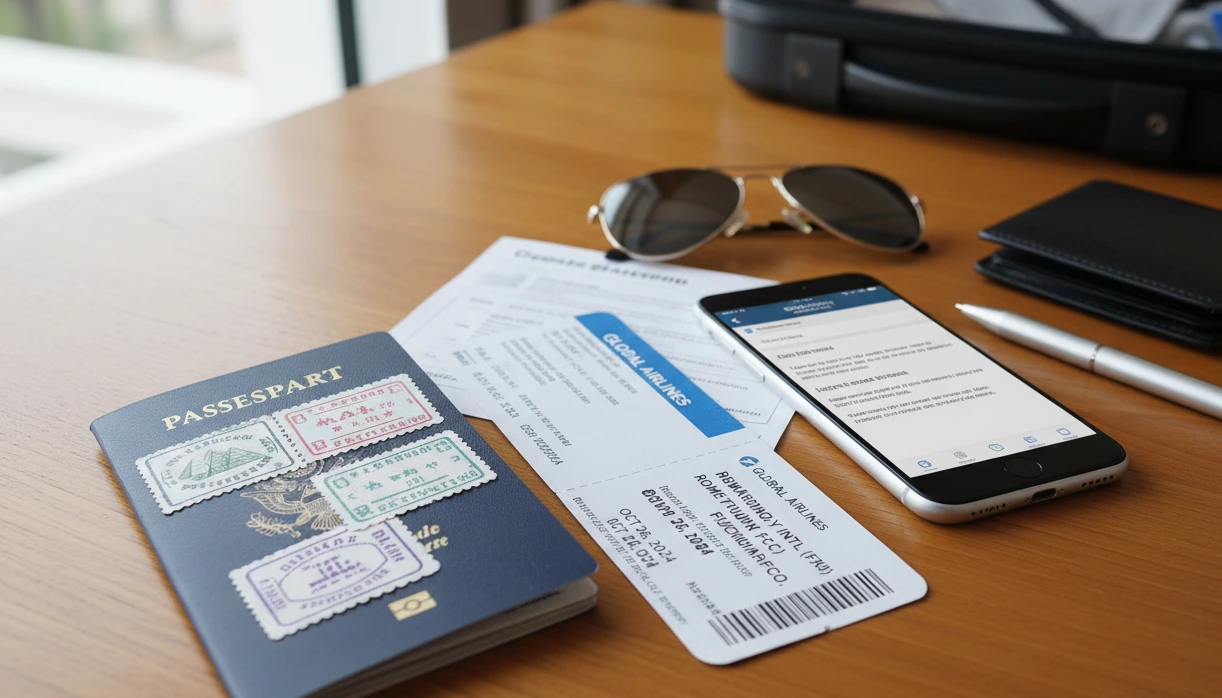
When you talk about onward proof, you are really answering one quiet question behind every Maldives tourist visa check: will you leave on time? Airlines and immigration look at your tickets, bookings, and documents to see whether you meet the basic entry requirements or if your plans might turn into a problem later.
For you, as a foreign national from India, that usually means lining up an onward ticket, a valid passport, solid hotel confirmations, and enough money so that traveling to the Maldives looks like a short, well-planned trip rather than an open-ended move. Avoid last-minute airport stress by getting a verified dummy ticket booking before you check in. 👉 Order your dummy ticket today for peace of mind.
A Simple Return Ticket: Still The Easiest Way To Keep Things Smooth
For most Indian holidaymakers, a straightforward round trip is still the cleanest form of onward proof. When an officer sees return journey confirmed tickets that match your resort dates and a sensible stay in the Maldives, your profile instantly looks like a normal tourist case.
Before you fly, double-check the passport validity printed in your booklet. Airlines routinely refuse boarding to passengers with an extended trip planned if the validity in their passports does not cover the whole journey plus a small buffer. You must travel on your own passport and keep it in good condition.
To keep things tidy, pair your ticket with a prepaid confirmed hotel booking or another prepaid confirmed booking at a registered hotel. Carrying a printed confirmed hotel booking on top of the email version reassures staff that your first few nights are sorted and that you are not planning to search for a room only after landing.
Add proof of sufficient funds through bank statements, cards, or salary slips, and it becomes much easier for everyone to see that you can comfortably finance your stay in Maldives. If your ticket fits safely within the usual window and your flight time back to India matches your story, no one cares which website or digital platform you used to book it. For added security, digital wallets showing transaction history can supplement traditional statements.
Regional Exit Tickets: Perfect For Multi-Country Trips
If your route is wider than a simple India–Maldives–India loop, a regional exit works just as well as a classic return. Your onward ticket might point to onward destinations like Colombo, Dubai, or Bangkok, and airline staff mainly want to see journey confirmed tickets that prove you will leave the islands on time.
In this setup, your travel document does double duty. It proves who you are and also that a foreigner traveling onward holds whatever visa requirements or approvals the next country needs. Some countries require pre-approval through an online visa application, some let you walk in upon arrival, and some impose special rules for transit travellers even if you stay airside.
Health rules can matter here, too. If your route passes through yellow fever endemic countries, officials may ask for yellow fever vaccination records and, in stricter places, a yellow fever vaccination certificate as part of the following documents you present. Forgetting this in the pre period before departure can turn a smooth connection into a long discussion at the counter.
Plan your arrival date, connections, hotel nights, and budget so that everything fits together logically and stays within the maximum duration allowed. Done right, a regional exit ticket is a strong answer to any question about how you will enter the Maldives and move on. Coordinating with multi-leg apps ensures seamless integration of these tickets.
What About Cruises, Ferries, And Less Common Exits?
Not everyone exits by air. Some foreigners arriving in the Maldives board cruises or liveaboards that continue to ports in neighbouring countries. In that situation, your boat ticket can function much like confirmed return journey tickets, as long as the itinerary and port details are clear.
Make sure the passenger name on the booking matches the same passport you will show at check-in in so there is no doubt that the reservation belongs to you. Many cruise and ferry operators now issue tickets on a digital platform where bookings are submitted electronically and sometimes filled electronically, so keep the email and a print-out handy.
These companies still have to respect the Maldives immigration act and cooperate with immigration clearance rules. That coordination helps guarantee entry for genuine tourists, protects public-health policies such as yellow fever vaccination checks, and supports wider economic development by keeping movements predictable.
If you rely on a boat exit, time your sailing so it aligns neatly with your stay in the Maldives, keep at least one prepaid confirmed booking for accommodation, and arrive at the pier in good time so there is no unexplained gap between landing and boarding. Luxury liveaboards often provide built-in onward proof, simplifying the process for adventure seekers.
Matching Your Dates With Your Allowed Stay
Even the best onward ticket can cause questions if your dates do not make sense with local rules. Tourists can be allowed up to 90 days in total, but the first stamp you receive upon arrival is usually shorter, and longer stays are managed through a permit extension form rather than guesswork.
For a simple beach holiday, it is safer to keep your onward ticket within the first couple of weeks of your stay in the Maldives and adjust later only if your plans genuinely change. If you do need more time, you follow the formal process instead of pushing your exit date right up to the edge.
People travelling for work play by a different rulebook. Holding a work visa also means having a valid work permit that matches the employer and job you actually intend to do, often supported by recruitment agencies. Others arrive on family or sponsorship routes, such as a marriage visa, a dependent visa, or a pre-approved sponsorship visa.
In those paths, your dependent status usually rests on a marriage certificate and on the Maldivian national or resident sponsor keeping their own paperwork current. Whatever the category, officers expect your onward ticket, your documents, and your story to match. Extension applications require detailed justifications, often including updated financial proofs.
The Supporting Documents That Strengthen Your Case
Onward proof is only one part of the picture. Officers also look for financial means, so you can provide proof that you will not need to work illegally to pay your bills. Neat paperwork helps here, especially when each application form is completed clearly.
You should also look after the physical condition of your passport. Passports are not allowed to have torn pages, damaged photos, or a scraped machine-readable zone if you want airlines to process you without drama. These checks are not there to intimidate you; they simply make the Maldives arrival immigration faster for everyone.
The same mindset applies if you are applying for a business visa or another non-tourist status. People with Israeli passports, long extended validity documents, or other special cases still need to show that they have realistic onward plans and respect the rules of the Maldives arrival immigration. Digital scans on secure apps can backup physical docs for quick access.
When A Reservation Works Better Than A Fully Paid Ticket
Sometimes you do not want to lock in a fully paid return, especially if prices move a lot or you are still finalising your route. In that situation, a time-limited reservation that matches your story can be enough to help you enter the Maldives smoothly while keeping options open.
What matters is that the dates line up with your first stamp, that the booking uses the same details you will use to enter the Maldives at the border, and that it respects the typical maximum duration tourists receive. If your IMUGA declaration or airline forms are done online, aim to submit them within 96 hours, with all details consistent across every document.
Used this way, a reservation supports you when you are clearing Maldives arrival immigration because it shows the staff that your onward plan is real, even if you later adjust the exact dates. Services offering verifiable PNRs ensure this reservation holds up under scrutiny, saving time and money.
Airline Check-In Vs Maldives Immigration: Where Onward Tickets Really Matter
So far, we have talked about who is likely to be asked for proof of onward travel and what kinds of tickets usually work. Now it is time to deal with the part that actually causes most stress for Indian travelers. The real trouble often starts before you even leave India.
You are usually checked twice. Once by the airline at departure, and then again by immigration in Malé. Each side has different priorities, and that is why the onward ticket rule can feel confusing. If your trip is still flexible, book a dummy ticket so you can satisfy onward proof without locking real dates.
Why Airlines In India Can Be Stricter Than Maldives Immigration
Before you even think about the Malé airport queue, your first hurdle is the check-in counter in India. Airlines are responsible for carrying only passengers who meet the entry rules for the destination country. If you are refused entry in the Maldives, the airline can be fined and must fly you back at its own cost.
Because of that, airlines follow the rulebook very closely. They use systems that tell them whether a country expects proof of onward travel and hotel bookings. If the Maldives is flagged as requiring a return or onward ticket, many check-in agents will not let you board until they see it.
From your side, it can feel unfair. You might know a friend who flew in on a one-way ticket without any questions. But the airline staff at your Indian airport cannot take that risk. They cannot call Malé and ask immigration to promise that you will be let in. They can only go by what their system says.
This is why you hear more stories about people being stopped at check-in than being turned around at Malé. The airline is protecting itself. You need to protect your trip by having something that satisfies the person behind that counter. Low-cost carriers like IndiGo often enforce this more rigorously during high-traffic periods.
Real Airport Situations Indian Travelers Actually Face
It helps to picture the kinds of situations we see again and again. When you understand these patterns, you can design your own documents to avoid them.
One common story is the backpacker from Kochi or Bengaluru with a one-way ticket to Malé. They tell the check-in agent they will “book the onward flight later.” The agent checks the system, sees that onward proof is required, and politely refuses boarding until they buy a ticket out of the Maldives. The traveler ends up paying for an expensive last-minute return flight they did not plan to use.
Another case is the couple with a return ticket dated around 30 days after arrival. Technically, this can still be allowed, but the dates sit right at the edge of the usual tourist stay. At check-in, the airline might accept it. At Malé, an immigration officer may ask more questions about funds and where they are staying. If the couple shows weak proof of money or no bookings beyond the first two nights, the officer can shorten the permitted stay.
A third scenario is the digital nomad who has plenty of money but a very unclear itinerary. They fly in with a one-way ticket, only one night of hotel booked, and a plan to “see where life takes them.” Airline staff, and later immigration both see an increased chance of an overstay. That is when the questions start.
You do not want to be the example in any of those stories. A little preparation removes most of that friction. Sharing these anecdotes in travel groups can help others prepare similarly.
Flexible, Refundable, And “Throwaway” Tickets: Do They Really Help?
Because onward proof is mainly about showing intent, many travelers try to solve it with flexible or sacrificial tickets. Each option has trade-offs, especially if you are starting in India, where fares to the Maldives can be high in season.
A fully refundable return ticket looks perfect on paper. It is real, easy to show, and usually satisfies both the airline and immigration. The problem is cost. You might have to block a large amount on your card, then wait days or weeks for a refund after you cancel. Currency conversion and fees can nibble away at your money.
Flexible tickets with low change fees can also be useful. They let you move your return date once you are sure of your plans. The issue is that “flexible” often still means paying a fee plus any fare difference, which can be significant on busy routes.
Some people go for the cheapest possible “throwaway” ticket. They book a low fare out of the Maldives that they never intend to use. This solves the immediate check-in problem but wastes money and can still become expensive if you buy close to departure. It also locks you to a specific date that may not match your real travel rhythm.
All three approaches can work. The question is whether the cost and hassle are worth it compared to your level of flexibility. Comparing fees across airlines via tools like Google Flights can optimize choices.
Leaning On Legitimate Reservation Services For Onward Proof
If your plan is genuinely open, there is another path that often makes more sense. Instead of paying for a full return, you use a legitimate reservation that exists in the airline system for a short period. It gives you a real booking reference that staff can see when they check your details.
This is where services like dummyflights.com can help. We provide genuine, verifiable flight reservations with a live PNR that airlines can look up at the counter. You receive a PDF booking within minutes, usually for a fraction of what a fully flexible ticket would cost. For many Indian travelers on one-way trips or long routes, that is enough to satisfy onward proof at check-in and immigration while keeping long-term plans flexible.
The key is that the reservation must be real and verifiable, not a random screenshot. When the PNR works and the dates make sense, staff can relax, and you can focus on your journey instead of explaining your route for twenty minutes. Over 10,000 Indian users have used such services for Maldives trips alone in the past year.
Build A Simple “No Drama” Document Pack
In the end, onward proof is just one piece of the entry puzzle. If you want a calm experience from your Indian airport all the way to your Malé hotel, think in terms of a small, tidy document pack.
For most travelers, that means:
- A clear return or onward ticket that sits well inside your allowed stay
- Hotel or guesthouse bookings for at least the first few nights
- Screenshots or notes for any island-hopping plans
- A basic proof of funds, even if no one asks to see it
- Your IMUGA confirmation and any other required forms are saved offline
When you walk up to the check-in counter with everything in place, the conversation becomes short and routine. The agent sees that you understand the rules. Immigration in Malé sees the same. You move past the formalities quickly and get to the part you actually care about, which is enjoying your time in the Maldives. Organizing this in a dedicated travel app folder ensures quick access during checks.
Before You Take Off: Smart Last-Minute Checks For Maldives Visa
If you are heading to the Maldives for a short resort break, keep it simple. Book a clear round-trip ticket, hold your hotel confirmations, fill IMUGA correctly, and carry basic proof of funds. For most Indian travelers, that is more than enough to sail through airline checks and immigration without drama.
If you are a backpacker or digital nomad with flexible plans, treat onward proof as non-negotiable. Use a solid itinerary, a verifiable onward ticket or reservation, and a couple of accommodation bookings to show you know exactly how you will exit. And before you fly, always recheck the latest rules on the official Maldives Immigration website and with your airline, because entry policies and onward ticket enforcement can change quietly in the background. Secure your Maldives plans in minutes with a dummy ticket booking you can show at the airport.
To further prepare, consider weather patterns—monsoon seasons can affect ferry schedules—and pack accordingly for eco-friendly resorts emphasizing sustainability. Double-checking COVID-era health declarations, though eased, remains a good habit.
What Travelers Are Saying
Frequently Asked Questions About Dummy Tickets for Maldives
To wrap up our guide, here are some common queries from Indian travelers planning their Maldives escape:
Q: How long is a dummy ticket valid for Maldives onward proof?
A: Typically 24-48 hours in the airline system, but enough to clear check-in and immigration. Always confirm with your service provider.
Q: Can I use a dummy ticket for IMUGA declaration?
A: Yes, as long as it includes a verifiable PNR and matches your itinerary dates.
Q: What if my real return date changes after using a dummy ticket?
A: No issue—dummy tickets are for proof only; book real flights separately without conflicts.
Q: Are dummy tickets accepted by all airlines flying to Maldives?
A: Most major carriers like Air India and IndiGo verify PNRs, so yes, if legitimate.
Q: How much does a dummy ticket cost compared to a real one?
A: Often 10-20% of a flexible ticket, making it budget-friendly for flexible plans.
These FAQs address the most pressing concerns, but for personalized advice, visit our blogs.
Related Guides
Why Travelers Trust dummyflights.com
dummyflights.com has been helping travelers since 2019, specializing exclusively in verifiable dummy ticket reservations for visa and onward proof needs. We've supported over 50,000 visa applicants, including thousands heading to Maldives, with our dedicated service ensuring seamless airport experiences.
Our 24/7 customer support team, composed of travel experts, provides real-time assistance—no automated responses here. We prioritize secure online payments and instant PDF delivery, so you get your documents in minutes. As a registered business with a focus on compliance, dummyflights.com delivers niche expertise you can rely on for stress-free travel planning.
About the Author
Visa Expert Team - With over 10 years of combined experience in travel documentation and visa assistance, our team at dummyflights.com specializes in creating verifiable travel itineraries. We’ve helped thousands of travelers navigate visa processes across 50+ countries, ensuring compliance with embassy standards.
Trusted Sources
Important Disclaimer
While our dummy tickets with live PNRs are designed to meet common embassy requirements, acceptance is not guaranteed and varies by consulate or country. Always verify specific visa documentation rules with the relevant embassy or official government website before submission. dummyflights.com is not liable for visa rejections or any legal issues arising from improper use of our services.


